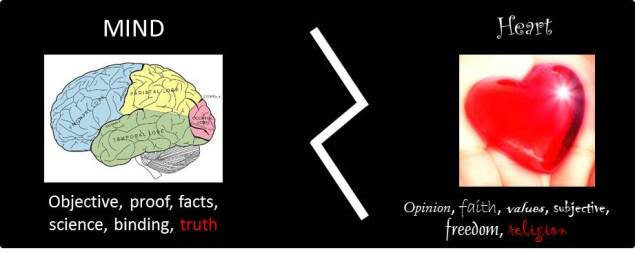COMPELLING TRUTH
Faith
Part 2: Defining faith
By Robin Schumacher
What is the relationship between truth and faith? The whole idea of mixing proof/truth and faith bothers some Christians and so they tend to bifurcate the two much in the same way philosopher Immanuel Kant separated his phenomenal and noumenal realms. This stance on both the religious and irreligious side has led to the following perception:

On the one side we have something that's objective and true (science is normally hailed as the champion here) that's associated with the mind, and on the other side we have subjectivity and opinions, where religion is relegated; just a matter of emotion and the heart. That's why in Penn and Teller's famous HBO critique of Christianity they say, "If you believe that the Bible is real because of faith, we can't touch you. . . . They [Christians] pride themselves on believing things that are hard to believe in. They think God will bless them for that. But if you want history or fact in your Bible, you are so *******"
We see/hear this attitude all the time. "Oh, you're a person of faith…" You can almost feel the condescending pat on the head when such a statement is made. Because, after all, faith is a belief you have in the absence of evidence and proof isn't it? That's why it's called ‘faith', right?
Wrong. That's not how the Bible defines faith at all. And I am so glad that it doesn't.
Think about where such thinking leads. If it's correct that faith is believing something without substantiation, then strong faith is when you believe something that you suspect isn't true. And the strongest kind of faith must be when you embrace something that you know isn't true. Just like Mark Twain said, "Faith is believing something you know ain't so."
But again, that's not how the Bible defines faith. In the Greek language there are a number of words that could have been used to convey the meaning of faith. The Hellenistic and classical Greeks used the term "nomizo" to describe belief in their gods. It basically means "I believe" but has no foundation for that belief other than it is something that was passed along by tradition (e.g. by parents, etc.) This word is never used in the Greek New Testament to speak of faith.
Instead, the terms "pistis" is used in Scripture. It is a noun that comes from the verb "peitho", which means "to be persuaded". If you check the best lexicon (BDAG) for the meaning of "pistis", you'll find the following:
1. state of believing on the basis of the reliability of the one trustedThe concept of blind faith or faith without any reason is foreign to the New Testament, which is why constantly in the book of Acts it says Paul "reasoned" with his audiences. In fact, the writer of Hebrews specifically says, "Now faith is the substance of things hoped for, the evidence of things not seen" (Heb. 11:1). Do you see that? "Substance", which is literally defined as "actual being" and "reality" in Greek. And there's the word "evidence" as plain as day.
2. trust, confidence
3. that which evokes trust
4. reliability, fidelity
5. pertaining to being worthy of belief or trust
Such a definition of faith tears down people like Sigmund Freud's contemptible description of faith and religion: "They [religious beliefs] are illusions, fulfillments of the oldest, strongest, and most urgent wishes of mankind. We call belief an illusion when a wish-fulfillment is a prominent factor in its motivation, and in doing so we disregard its relation to reality, just as the illusion itself sets no store by verification."
No, faith beds down quite nicely with reality and truth. Having a correct understanding of how faith is defined in the Bible helps dissolve the invalid division that Kant and modern society have erected between truth and faith. We instead find something more along these lines:

Both heart and mind come together where real faith is concerned. As Ravi Zacharias puts it, "What I believe in my heart must make sense in my mind."
What about the "hoped for" and "things not seen" parts of the statement in Hebrews 1:1? Rather than repeat what I've said before on this subject, see my blog post that talks about how God uses evidence in this life to point to things we can't see that are real in the next.
Next: Part 3: Faith that and faith in–an important distinction
Faith, The Series
Part 1: What is faith?
Part 2: Defining faith
Part 3: Faith that and faith in–an important distinction
Part 4: What it takes to have faith
Part 5: The biblical concept of faith
Image Credit: Allan Ajifo, aboutmodafinil.com; "brain"; Creative Commons. Louise Docker; "My heart in your hands"; Creative Commons
comments powered by Disqus
Reposted 5-20-13

